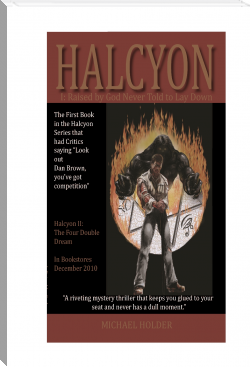Crisis Management: Beyond the Call of Duty by Craig A. McDonough (best inspirational books .txt) 📕

- Author: Craig A. McDonough
- Performer: -
Book online «Crisis Management: Beyond the Call of Duty by Craig A. McDonough (best inspirational books .txt) 📕». Author Craig A. McDonough
30. So in war, the way is to avoid what is strong and to strike at what is weak.
[Like water, taking the line of least resistance.]
31. Water shapes its course according to the nature of the ground over which it flows; the soldier works out his victory in relation to the foe whom he is facing.
32. Therefore, just as water retains no constant shape, so in warfare there are no constant conditions.
33. He who can modify his tactics in relation to his opponent and thereby succeed in winning, may be called a heaven-born captain.
34. The five elements (water, fire, wood, metal, earth) are not always equally predominant;
[That is, as Wang Hsi says: "they predominate alternately."]
the four seasons make way for each other in turn.
[Literally, "have no invariable seat."]
There are short days and long; the moon has its periods of waning and waxing.
[Cf. V. § 6. The purport of the passage is simply to illustrate the want of fixity in war by the changes constantly taking place in Nature. The comparison is not very happy, however, because the regularity of the phenomena which Sun Tzŭ mentions is by no means paralleled in war.]
[1] See Col. Henderson’s biography of Stonewall Jackson, 1902 ed., vol. II, p. 490.
1. Sun Tzŭ said: In war, the general receives his commands from the sovereign.
2. Having collected an army and concentrated his forces, he must blend and harmonise the different elements thereof before pitching his camp.
["Chang Yu says: "the establishment of harmony and confidence between the higher and lower ranks before venturing into the field;" and he quotes a saying of Wu Tzŭ (chap. 1 ad init.): "Without harmony in the State, no military expedition can be undertaken; without harmony in the army, no battle array can be formed." In an historical romance Sun Tzŭ is represented as saying to Wu Yuan: "As a general rule, those who are waging war should get rid of all the domestic troubles before proceeding to attack the external foe."]
3. After that, comes tactical manœuvering, than which there is nothing more difficult.
[I have departed slightly from the traditional interpretation of Ts’ao Kung, who says: "From the time of receiving the sovereign’s instructions until our encampment over against the enemy, the tactics to be pursued are most difficult." It seems to me that the tactics or manœuvers can hardly be said to begin until the army has sallied forth and encamped, and Ch’ien Hao’s note gives color to this view: "For levying, concentrating, harmonizing and entrenching an army, there are plenty of old rules which will serve. The real difficulty comes when we engage in tactical operations." Tu Yu also observes that "the great difficulty is to be beforehand with the enemy in seizing favourable position."]
The difficulty of tactical manœuvering consists in turning the devious into the direct, and misfortune into gain.
[This sentence contains one of those highly condensed and somewhat enigmatical expressions of which Sun Tzŭ is so fond. This is how it is explained by Ts’ao Kung: "Make it appear that you are a long way off, then cover the distance rapidly and arrive on the scene before your opponent." Tu Mu says: "Hoodwink the enemy, so that he may be remiss and leisurely while you are dashing along with utmost speed." Ho Shih gives a slightly different turn: "Although you may have difficult ground to traverse and natural obstacles to encounter this is a drawback which can be turned into actual advantage by celerity of movement." Signal examples of this saying are afforded by the two famous passages across the Alps—that of Hannibal, which laid Italy at his mercy, and that of Napoleon two thousand years later, which resulted in the great victory of Marengo.]
4. Thus, to take a long and circuitous route, after enticing the enemy out of the way, and though starting after him, to contrive to reach the goal before him, shows knowledge of the artifice of deviation.
[Tu Mu cites the famous march of Chao She in 270 B.C. to relieve the town of O-yu, which was closely invested by a Ch’in army. The King of Chao first consulted Lien P’o on the advisability of attempting a relief, but the latter thought the distance too great, and the intervening country too rugged and difficult. His Majesty then turned to Chao She, who fully admitted the hazardous nature of the march, but finally said: "We shall be like two rats fighting in a whole—and the pluckier one will win!" So he left the capital with his army, but had only gone a distance of 30 li when he stopped and began throwing up entrenchments. For 28 days he continued strengthening his fortifications, and took care that spies should carry the intelligence to the enemy. The Ch’in general was overjoyed, and attributed his adversary’s tardiness to the fact that the beleaguered city was in the Han State, and thus not actually part of Chao territory. But the spies had no sooner departed than Chao She began a forced march lasting for two days and one night, and arrive on the scene of action with such astonishing rapidity that he was able to occupy a commanding position on the "North hill" before the enemy had got wind of his movements. A crushing defeat followed for the Ch’in forces, who were obliged to raise the siege of O-yu in all haste and retreat across the border.]
5. Manœuvering with an army is advantageous; with an undisciplined multitude, most dangerous.
[I adopt the reading of the T’ung Tien, Cheng Yu-hsien and the T’u Shu, since they appear to apply the exact nuance required in order to make sense. The commentators using the standard text take this line to mean that manœuvers may be profitable, or they may be dangerous: it all depends on the ability of the general.]
6. If you set a fully equipped army in march in order to snatch an advantage, the chances are that you will be too late. On the other hand, to detach a flying column for the purpose involves the sacrifice of its baggage and stores.
[Some of the Chinese text is unintelligible to the Chinese commentators, who paraphrase the sentence. I submit my own rendering without much enthusiasm, being convinced that there is some deep-seated corruption in the text. On the whole, it is clear that Sun Tzŭ does not approve of a lengthy march being undertaken without supplies. Cf. infra, § 11.]
7. Thus, if you order your men to roll up their buff-coats, and make forced marches without halting day or night, covering double the usual distance at a stretch,
[The ordinary day’s march, according to Tu Mu, was 30 li; but on one occasion, when pursuing Liu Pei, Ts’ao Ts’ao is said to have covered the incredible distance of 300 li within twenty-four hours.]
doing a hundred li in order to wrest an advantage, the leaders of all your three divisions will fall into the hands of the enemy.
8. The stronger men will be in front, the jaded ones will fall behind, and on this plan only one-tenth of your army will reach its destination.
[The moral is, as Ts’ao Kung and others point out: Don’t march a hundred li to gain a tactical advantage, either with or without impedimenta. Manœuvers of this description should be confined to short distances. Stonewall Jackson said: "The hardships of forced marches are often more painful than the dangers of battle." He did not often call upon his troops for extraordinary exertions. It was only when he intended a surprise, or when a rapid retreat was imperative, that he sacrificed everything for speed. [1] ]
9. If you march fifty li in order to outmanœuver the enemy, you will lose the leader of your first division, and only half your force will reach the goal.
[Literally, "the leader of the first division will be torn away."]
10. If you march thirty li with the same object, two-thirds of your army will arrive.
[In the T’ung Tien is added: "From this we may know the difficulty of manœuvering."]
11. We may take it then that an army without its baggage-train is lost; without provisions it is lost; without bases of supply it is lost.
[I think Sun Tzŭ meant "stores accumulated in dépôts." But Tu Yu says "fodder and the like," Chang Yu says "Goods in general," and Wang Hsi says "fuel, salt, foodstuffs, etc."]
12. We cannot enter into alliances until we are acquainted with the designs of our neighbours.
13. We are not fit to lead an army on the march unless we are familiar with the face of the country—its mountains and forests, its pitfalls and precipices, its marshes and swamps.
14. We shall be unable to turn natural advantages to account unless we make use of local guides.
[§§. 12-14 are repeated in chap. XI. § 52.]
15. In war, practise dissimulation, and you will succeed.
[In the tactics of Turenne, deception of the enemy, especially as to the numerical strength of his troops, took a very prominent position. [2] ]
Move only if there is a real advantage to be gained.
16. Whether to concentrate or to divide your troops, must be decided by circumstances.
17. Let your rapidity be that of the wind,
[The simile is doubly appropriate, because the wind is not only swift but, as Mei Yao-ch’en points out, "invisible and leaves no tracks."]
your compactness that of the forest.
[Meng Shih comes nearer to the mark in his note: "When slowly marching, order and ranks must be preserved"—so as to guard against surprise attacks. But natural forest do not grow in rows, whereas they do generally possess the quality of density or compactness.]
18. In raiding and plundering be like fire,
[Cf. Shih Ching, IV. 3. iv. 6: "Fierce as a blazing fire which no man can check."]
in immovability like a mountain.
[That is, when holding a position from which the enemy is trying to dislodge you, or perhaps, as Tu Yu says, when he is trying to entice you into a trap.]
19. Let your plans be dark and impenetrable as night, and when you move, fall like a thunderbolt.
[Tu Yu quotes a saying of T’ai Kung which has passed into a proverb: "You cannot shut your ears to the thunder or your eyes to the lighting—so rapid are they." Likewise, an attack should be made so quickly that it cannot be parried.]
20. When you plunder a countryside, let the spoil be divided amongst your men;
[Sun Tzŭ wishes to lessen the abuses of indiscriminate plundering by insisting that all booty shall be thrown into a common stock, which may afterwards be fairly divided amongst all.]
when you capture new territory, cut it up into allotments for the benefit of the soldiery.
[Ch’en Hao says "quarter your soldiers on the land, and let them sow and plant it." It is by acting on this principle, and harvesting the lands they invaded, that the Chinese have succeeded in carrying out some of their most memorable and triumphant expeditions, such as that of Pan Ch’ao who penetrated to the Caspian, and in more recent years, those of Fu-k’ang-an and Tso Tsung-t’ang.]
21. Ponder and deliberate before you make a move.
[Chang Yu quotes Wei Liao Tzŭ as saying that we must not break camp until we have gained the resisting power of the enemy and the cleverness of the opposing general. Cf. the "seven comparisons" in I. § 13.]
22. He will conquer who has learnt the artifice of deviation.
[See supra, §§ 3, 4.]
Such is the art of manœuvering.
[With these words, the chapter would naturally come to an end. But there now follows a long appendix in the shape of an extract from an earlier book on War, now lost, but apparently extant at the time when Sun Tzŭ wrote. The style of this fragment is not noticeably different from that of Sun Tzŭ himself, but no commentator raises a doubt as to its genuineness.]
23. The





Comments (0)